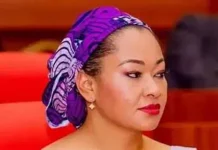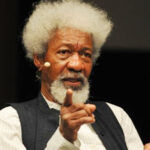Juju singer, Kingsley Okechukwu, popularly called ‘Omo nna to n ko juju’ tells MOBOLA SADIQ about how he started singing juju music, his initial fears of being stereotyped and other issues
Of all the genres of music, why did you choose juju?
I grew up in a musical home. My father used to play all kinds of music in the house, and that was where my love for music started. I chose juju music because I am a member of Decross Gospel Church, which is headed by Ebenezer Obey Fabiyi. I listened to his tapes and ministrations in church and that was where my love for juju music started. I chose juju because of the love and passion I have for it
Where did you learn it
I learnt juju music from ‘Chief Commander’ Ebenezer Obey Fabiyi. He is a mentor and a great teacher.
Tell us about your background and educational qualifications.
I was born on September 1, 1982, into the family of Mr and Mrs Mathew Okechukwu, in the Orile Agege area of Lagos State. I had my elementary education at Moses Orimolade Primary School, Oke Koto, Agege. Thereafter, I proceeded to Stadium Grammar School, Ifako Ijaiye also in Lagos.
Juju music is performed mostly by artistes from the south-western part of Nigeria. How hard was it for you to blend into the genre?
I grew up in Agege, and fortunately, I speak and understand Yoruba language. Thus, it was quite easy for me to understand juju music. However, one of the things that initially bothered me was if I would be accepted in the juju industry because of my name. On a second thought, I told myself that should not be a problem because I am a Nigerian and I believe as a citizen, I should not be stereotyped because of my ethnicity.
Later, I joined Decross Gospel Church and being under the tutelage of Ebenezer Obey was one of the best things for me because it helped me blend into juju music effortlessly. It actually made my music career less difficult. Obey showed me fatherly love. Another thing that also worked for me is that I have many Yoruba friends. My relationships with them have helped me to learn and understand Yoruba adages, which have been quite useful in composing my songs.
What were you doing before you started singing and how long have you been in the industry?
I used to be a drummer at the Decross Gospel Mission. I have always had passion for music and knew I would toe that path someday. I officially started singing juju music in 2006 and since then, I have never looked back. Interestingly, when I was still in primary school, a teacher, Mrs Abiodun, tried so hard to discourage me from singing juju music. She always beat me but I was so determined and was not ready to give up.
How helpful has your mentor been in your music career?
Ebenezer Obey has been more than a mentor to me. His words of wisdom have pushed me further to challenge myself in every area of my life, especially music. He has stood by me and prayed for me. He also played the roles of a father and a boss.
Do you think you can fill the shoes of the likes of King Sunny Ade and Ebenezer Obey?
All I want to focus on for now is composing good songs for my fans and ensuring I keep growing and doing better. I think it is a big deal to say I want to fit into the shoes of those legends. I just want to keep working hard and make a name for myself. I would hopefully love to be referred to as a juju music legend someday.
How do people react when you introduce yourself as ‘Omo nna to n ko juju’ (Igbo man singing juju)?
You would agree with me that it is quite strange seeing an Igbo man singing juju music. In the early days of my career, I often got cold responses from juju enthusiasts because they did not know what to expect. I think that was normal, though I felt awkward about it sometimes. But, people’s reactions usually changed when I started singing. They ended up accepting me with love. Most times, when I go for gigs, some people think I am the biological son of Ebenezer Obey because of the similarity of our sounds.
Is singing juju music a strategy for you to be popular in the music industry?
No, it is not a strategy. Juju is a genre of music I love so much. I cannot think of any better genre of music than juju. I understand juju music and I love singing it. Singing juju music comes naturally to me, so it is not a strategy I adopted to be known in the music industry.
Since you started singing juju music, has the feedback been encouraging?
Things were really challenging in the early stage and I almost to quit because the feedback was not encouraging. Some people felt an Igbo person should not be singing juju and that clouded their judgment of my music. But with time, some people began to give positive responses and that made me want to do more and be better.
What were some of the things you did that sharpened your skills?
Firstly, it was a case of total submission to the genre of music. Then, I rehearsed frequently. I tried to sample a lot of juju music by listening to the songs of musicians such as Ebenezer Obey, King Sunny Ade, Orlando Owoh and Fela Kuti.
Also, I tried my best to be open to new sounds and that really helped me to interpret music better. There were times I had to lock myself indoors to listen to Ebenezer Obey’s old songs.
Like in every other industry, there have been debates on who is the best juju musician. In your opinion, who holds that title?
In my candid opinion, the best are the two legendary artistes― Ebenezer Obey and King Sunny Ade. Those two are the best of all time as far as I am concerned. Both of them have done very well and raised the bar really high for artistes such as myself.
Some new generation juju artistes infuse afrobeat, hip hop and other elements to create new subgenres of juju music. How would you define your style?
I am open to new sounds but I would not change my style. I would like to stick to core juju music, just like those who carved a niche for themselves in the industry. I am aiming to register my own sound in people’s hearts and get more acceptability in the industry.
Some artistes get unexpected reactions from their fans during live performances. What experiences have you had?
I have had a few beautiful reactions from fans during my live performances. It could be quite overwhelming and it gives me a great feeling when music lovers appreciate my craft. Sometimes, when the love is much, I give out my CDs to my fans. One of the things that keep me going is knowing that people appreciate my talent.
Also, some influential persons have requested for autographs from me after my gigs.
How far has music taken you?
I have had opportunities to perform in different states in Nigeria, and that is something I am very grateful for. I still hope to travel out of the country to perform and serenade my fans in the Diaspora.
How would you assess the acceptance of juju music, especially now that other genres of music, such as afrobeats and hip hop, are becoming more popular?
Juju music is a special and unique genre that would always be evergreen in the music industry. The juju music industry is huge and has no rival. Those who love the sound would always listen to it. It used to be older people that loved the music but now, even the younger generations are beginning to enjoy it. I can categorically say that juju music is one of a kind.
Afrobeats and hip hop artistes are generally paid well for their performances. Is it the same for juju musicians?
The performance fees of artistes in different genres of music vary. In recent times, some hip hop artistes are paid well for their performances, even more than some new juju musicians. If an artiste is not well known or ‘big’, it could be a disadvantage. I think what matters more is for one to keep releasing good music in order to increase one’s worth.
Aside from the popular juju singers, it appears others don’t have huge fan base. What do you think about that?
It is a known fact that the songs of those juju legends are unique and evergreen. They have a huge fan base which they have built for decades, and those fans cannot be easily detached. Although some young juju artistes have their own followership, we all need to work to get to that height and even surpass it. If one keeps composing and releasing good songs, one would have one’s own audience over time. A good song would draw attention anywhere, so one should just put in one’s best and one would get a positive result.
Your album titled, ‘Orin Ope’, featured Ebenezer Obey. How was the experience working with him?
Featuring him on my album was a very proud moment for me and my family. I felt very elated to have worked with the ‘grand commander’. It was gratifying to learn a lot from him. Having his support was a dream come true for me. I am grateful to God for making it possible.
Some people believe that fuji music is more popular than juju. What’s your take on that?
I think every genre of music has its own audience and fans. So, I don’t want to compare fuji and juju music. The most important thing is that my fans are getting good music from me. I hope my fan base keeps expanding and growing.
What are your hobbies?
I have a lot of hobbies, including singing, playing drums and meeting new people. I also like driving.
Do you consider yourself to be a fashionable person?
Yes, I am a fashionable person. I love to look good. That is one of the things I learnt from my father. I love traditional outfits and I try to wear them as often as possible. I also love shoes and wristwatches. Most importantly, I love to smell nice always.
What are the things that people don’t know about you?
I am a devoted Christian. I love helping people and I trust easily. I am still single and hoping for the right woman to come my way.










